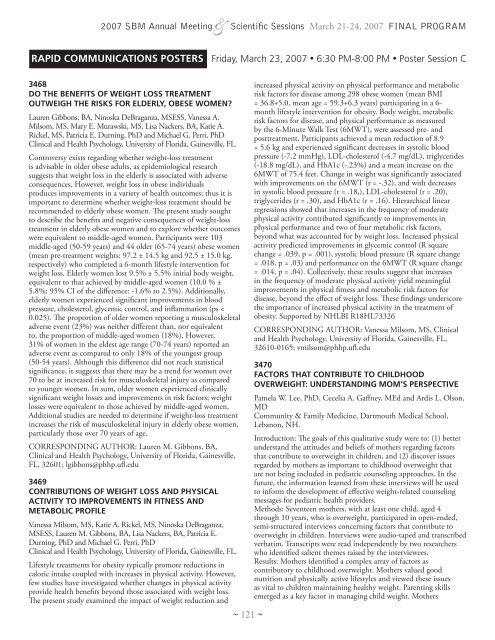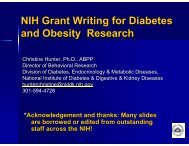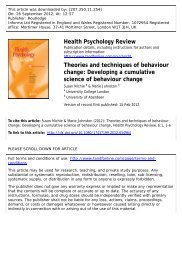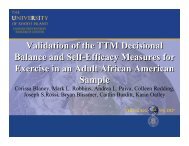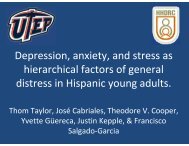2007 Final Program - Society of Behavioral Medicine
2007 Final Program - Society of Behavioral Medicine
2007 Final Program - Society of Behavioral Medicine
You also want an ePaper? Increase the reach of your titles
YUMPU automatically turns print PDFs into web optimized ePapers that Google loves.
<strong>2007</strong> SBM Annual Meeting & Scientific Sessions March 21-24, <strong>2007</strong> FINAL PROGRAM<br />
Rapid Communications Posters Friday, March 23, <strong>2007</strong> • 6:30 PM-8:00 PM • Poster Session C<br />
3468<br />
DO THE BENEFITS OF WEIGHT LOSS TREATMENT<br />
OUTWEIGH THE RISKS FOR ELDERLY, OBESE WOMEN?<br />
Lauren Gibbons, BA, Ninoska DeBraganza, MSESS, Vanessa A.<br />
Milsom, MS, Mary E. Murawski, MS, Lisa Nackers, BA, Katie A.<br />
Rickel, MS, Patricia E. Durning, PhD and Michael G. Perri, PhD<br />
Clinical and Health Psychology, University <strong>of</strong> Florida, Gainesville, FL.<br />
Controversy exists regarding whether weight-loss treatment<br />
is advisable in older obese adults, as epidemiological research<br />
suggests that weight loss in the elderly is associated with adverse<br />
consequences. However, weight loss in obese individuals<br />
produces improvements in a variety <strong>of</strong> health outcomes; thus it is<br />
important to determine whether weight-loss treatment should be<br />
recommended to elderly obese women. The present study sought<br />
to describe the benefits and negative consequences <strong>of</strong> weight-loss<br />
treatment in elderly obese women and to explore whether outcomes<br />
were equivalent to middle-aged women. Participants were 103<br />
middle-aged (50-59 years) and 44 older (65-74 years) obese women<br />
(mean pre-treatment weights: 97.2 ± 14.5 kg and 92.5 ± 15.0 kg,<br />
respectively) who completed a 6-month lifestyle intervention for<br />
weight loss. Elderly women lost 9.5% ± 5.5% initial body weight,<br />
equivalent to that achieved by middle-aged women (10.0 % ±<br />
5.8%; 95% CI <strong>of</strong> the difference: -1.6% to 2.5%). Additionally,<br />
elderly women experienced significant improvements in blood<br />
pressure, cholesterol, glycemic control, and inflammation (ps <<br />
0.025). The proportion <strong>of</strong> older women reporting a musculoskeletal<br />
adverse event (23%) was neither different than, nor equivalent<br />
to, the proportion <strong>of</strong> middle-aged women (18%). However,<br />
31% <strong>of</strong> women in the eldest age range (70-74 years) reported an<br />
adverse event as compared to only 18% <strong>of</strong> the youngest group<br />
(50-54 years). Although this difference did not reach statistical<br />
significance, it suggests that there may be a trend for women over<br />
70 to be at increased risk for musculoskeletal injury as compared<br />
to younger women. In sum, older women experienced clinically<br />
significant weight losses and improvements in risk factors; weight<br />
losses were equivalent to those achieved by middle-aged women.<br />
Additional studies are needed to determine if weight-loss treatment<br />
increases the risk <strong>of</strong> musculoskeletal injury in elderly obese women,<br />
particularly those over 70 years <strong>of</strong> age.<br />
CORRESPONDING AUTHOR: Lauren M. Gibbons, BA,<br />
Clinical and Health Psychology, University <strong>of</strong> Florida, Gainesville,<br />
FL, 32601; lgibbons@phhp.ufl.edu<br />
3469<br />
CONTRIBUTIONS OF WEIGHT LOSS AND PHYSICAL<br />
ACTIVITY TO IMPROVEMENTS IN FITNESS AND<br />
METABOLIC PROFILE<br />
Vanessa Milsom, MS, Katie A. Rickel, MS, Ninoska DeBraganza,<br />
MSESS, Lauren M. Gibbons, BA, Lisa Nackers, BA, Patricia E.<br />
Durning, PhD and Michael G. Perri, PhD<br />
Clinical and Health Psychology, University <strong>of</strong> Florida, Gainesville, FL.<br />
Lifestyle treatments for obesity typically promote reductions in<br />
caloric intake coupled with increases in physical activity. However,<br />
few studies have investigated whether changes in physical activity<br />
provide health benefits beyond those associated with weight loss.<br />
The present study examined the impact <strong>of</strong> weight reduction and<br />
~ 121 ~<br />
increased physical activity on physical performance and metabolic<br />
risk factors for disease among 298 obese women (mean BMI<br />
= 36.8+5.0, mean age = 59.3+6.3 years) participating in a 6-<br />
month lifestyle intervention for obesity. Body weight, metabolic<br />
risk factors for disease, and physical performance as measured<br />
by the 6-Minute Walk Test (6MWT), were assessed pre- and<br />
posttreatment. Participants achieved a mean reduction <strong>of</strong> 8.9<br />
+ 5.6 kg and experienced significant decreases in systolic blood<br />
pressure (-7.2 mmHg), LDL-cholesterol (-4.7 mg/dL), triglycerides<br />
(-18.8 mg/dL), and HbA1c (-.23%) and a mean increase on the<br />
6MWT <strong>of</strong> 75.4 feet. Change in weight was significantly associated<br />
with improvements on the 6MWT (r = -.32), and with decreases<br />
in systolic blood pressure (r = .18,), LDL-cholesterol (r = .20),<br />
triglycerides (r = .30), and HbA1c (r = .16). Hierarchical linear<br />
regressions showed that increases in the frequency <strong>of</strong> moderate<br />
physical activity contributed significantly to improvements in<br />
physical performance and two <strong>of</strong> four metabolic risk factors,<br />
beyond what was accounted for by weight loss. Increased physical<br />
activity predicted improvements in glycemic control (R square<br />
change = .039, p = .001), systolic blood pressure (R square change<br />
= .018, p = .03) and performance on the 6MWT (R square change<br />
= .014, p = .04). Collectively, these results suggest that increases<br />
in the frequency <strong>of</strong> moderate physical activity yield meaningful<br />
improvements in physical fitness and metabolic risk factors for<br />
disease, beyond the effect <strong>of</strong> weight loss. These findings underscore<br />
the importance <strong>of</strong> increased physical activity in the treatment <strong>of</strong><br />
obesity. Supported by NHLBI R18HL73326<br />
CORRESPONDING AUTHOR: Vanessa Milsom, MS, Clinical<br />
and Health Psychology, University <strong>of</strong> Florida, Gainesville, FL,<br />
32610-0165; vmilsom@phhp.ufl.edu<br />
3470<br />
FACTORS THAT CONTRIBUTE TO CHILDHOOD<br />
OVERWEIGHT: UNDERSTANDING MOM’S PERSPECTIVE<br />
Pamela W. Lee, PhD, Cecelia A. Gaffney, MEd and Ardis L. Olson,<br />
MD<br />
Community & Family <strong>Medicine</strong>, Dartmouth Medical School,<br />
Lebanon, NH.<br />
Introduction: The goals <strong>of</strong> this qualitative study were to: (1) better<br />
understand the attitudes and beliefs <strong>of</strong> mothers regarding factors<br />
that contribute to overweight in children, and (2) discover issues<br />
regarded by mothers as important to childhood overweight that<br />
are not being included in pediatric counseling approaches. In the<br />
future, the information learned from these interviews will be used<br />
to inform the development <strong>of</strong> effective weight-related counseling<br />
messages for pediatric health providers.<br />
Methods: Seventeen mothers, with at least one child, aged 4<br />
through 10 years, who is overweight, participated in open-ended,<br />
semi-structured interviews concerning factors that contribute to<br />
overweight in children. Interviews were audio-taped and transcribed<br />
verbatim. Transcripts were read independently by two researchers<br />
who identified salient themes raised by the interviewees.<br />
Results: Mothers identified a complex array <strong>of</strong> factors as<br />
contributory to childhood overweight. Mothers valued good<br />
nutrition and physically active lifestyles and viewed these issues<br />
as vital to children maintaining healthy weight. Parenting skills<br />
emerged as a key factor in managing child weight. Mothers


